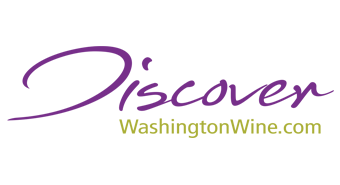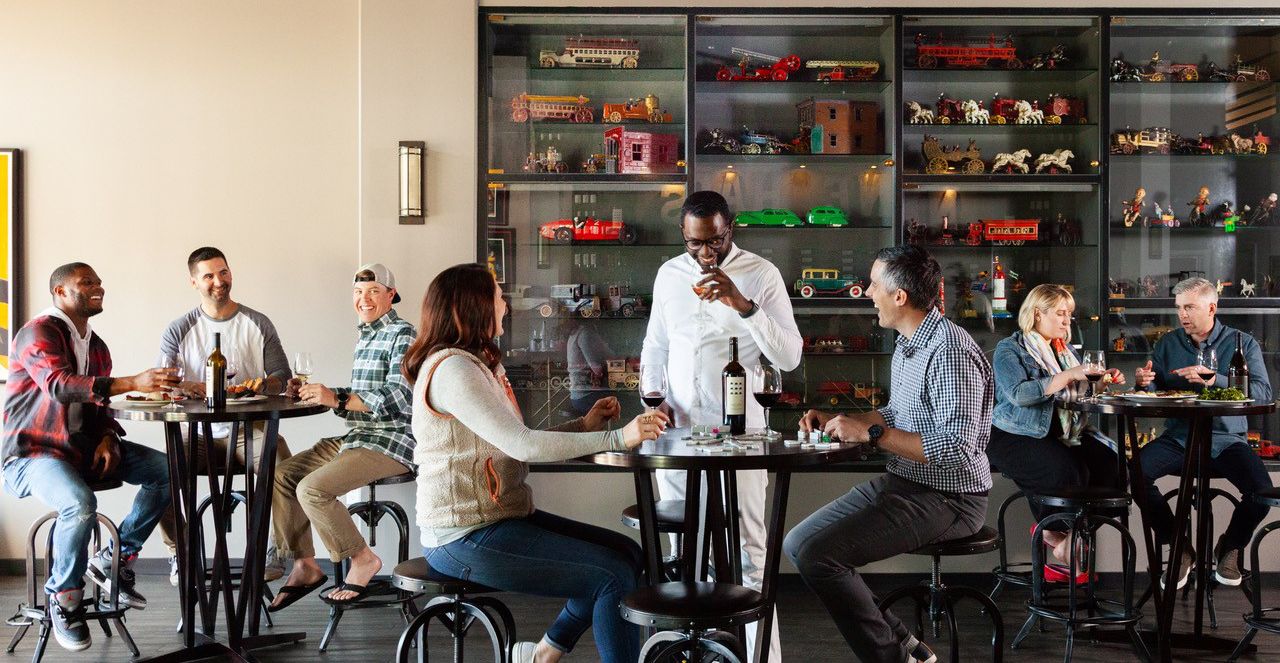It’s Not a Secret Anymore: Seattle Urban Wineries
Are a True Representation of Washington Wine
A diversity of winemakers, crafting a variety of unique and delicious wines, has brought the tastes of the state’s extraordinary vineyards to Seattle for anyone to try
By Mark Storer
The Seattle Urban Wineries Association is a collection of 26 wineries and tasting rooms located in the heart of Seattle, all of which create, taste and pour some of Washington’s best wines. The organization is loosely related to a group previously known as the Seattle Artisan Wineries. In the past few years, though, the group has created its own name with a diverse set of winemakers representative of Washington’s extraordinary diversity, and indicative of the state’s reputation as the wild frontier of the New World’s wine producers.
From the ashes of the pandemic and in response to it, the creativity on display from the 26 members of the association was symbolized best by the reigniting of its annual event, known as “Pour.” From large producers like Nine Hats and Browne Family Vineyards that produce 20,000 cases or more a year to small boutique and artisan producers like Laurelhurst, which produces 1,000 cases a year and Eight Bells, which produces 2,000 cases a year, the Association is a true representation of wine from Washington.
The Association reignited its annual “Pour” event this past October. “We sold out the tickets for the event, and even with the vaccine requirement and all, we had no trouble and it was a successful day for us,” explained Neil Maertens, President of the Association.
Maertens, who is also the tasting room manager at Elsom Cellars, echoed the sentiments of some of the Association’s members that Washington’s best vineyards are still undiscovered. “I also don’t know of anywhere else in the world where you’ll find as many female winemakers as you will here,” he said. “And it’s because in the wine world, it’s the new frontier. There’s nowhere that has the same kind of topography and terroir that we have and there’s all kinds of things here to try and discover.”
The Association’s non-profit status allows it to use dues from each of its members to help market the group’s wines and tasting rooms. “Our primary thing is to support each other,” Maertens added. “We have quarterly meetings to keep ourselves connected and talk together, so we borrow and buy or sell equipment and talk about what’s new in our various neighborhoods.”
This “hidden gem” of winemakers, crafting a variety of unique and delicious wines, has brought the tastes of the state’s extraordinary vineyards to Seattle for anyone to try. Working together to provide ease of access, monthly and annual tasting events and the ability to grow their own brands, the Association is stepping up its efforts in light of the city opening up again and providing customers a genuinely local taste of the Pacific Northwest.
Profiled below are eight of the Seattle Urban Wineries and the people who started them:
EIGHT BELLS WINERY
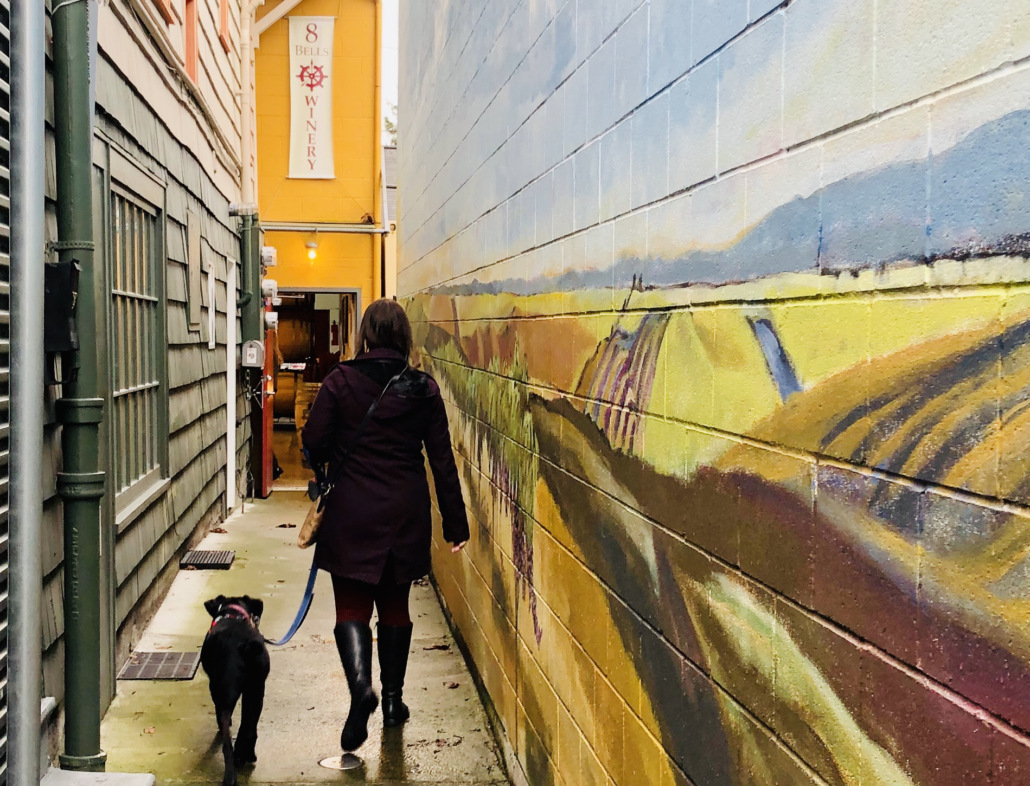
Hidden away down an alley off of Seattle’s Roosevelt Way near the University of Washington, Eight Bells Winery is not exactly the easiest of the 26 members of the Seattle Urban Wineries Association to find. But it’s certainly worth the adventure.
Eight Bells Winery sits at the north end of the Seattle Urban Wineries Map on Roosevelt Way near the University of Washington campus, and as such is sort of an “outlier” on the Urban Wineries map.
Established in 2009, a couple of the founding partners, Tim Bates, who is also the head winemaker, and Andy Shepherd used to work for the National Oceanic and Atmospheric Association and the nautical theme persists. Eight Bells is a reference to the saying, “Eight bells and all is well,” which meant a change of shift on-board ship and it was time for those on duty to relax and have a drink. Bates and Shepherd were joined by Frank Michiels when they founded the winery and now Michiels’ daughter, Taylor Nordby and her husband Kip are partners as well.
“We used to source our grapes from five different vineyards and over time we’ve consolidated down to two,” said Taylor, who is involved with the winery’s daily operations. “We source from Red Willow Vineyard and Boushey Vineyard in the Yakima Valley AVA.”
In their small space, Nordby said their customers and members get to see their wine-making process. “We’re not in a wine district, so when people come here, it’s because they want to have some interaction or spend some time and that works for us because we can share what we’re passionate about.” At the summer release of their Tempranillo and Viognier wines, club members and visitors were treated to live music inside the winery and several paella cooking stations in the parking lot. “Our neighbors are very patient and kind to us,” Nordby said.
From the two vineyards, Eight Bells makes a number of Bordeaux and Rhone varietals and some Sangiovese, as well as blends. Michiels said that about 85 percent of their grapes come from the Red Willow vineyard. “We also use a lot of field blending and multi-clonal varietals,” said Michiels. “Our Cabernet has 12 different clones in it and our Syrah has eight.”
In addition to the unique farming and use of multiple clones, the winery team uses flat glass bottle caps in place of corks, a practical, environmental and, yes, unique approach to bottling. Nordby said the winery’s unique founding, and its family of partners combined with its residential location provide a kind of wine haven for their club members and customers. “It’s a really great community. We’re an urban winery and a neighborhood winery and we feel that makes a good fit.”
ELSOM CELLARS
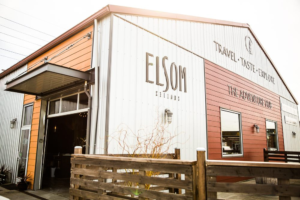
Located at 2960 4th Avenue South, Elsom Cellars is a quick, five-minute drive from downtown Seattle or a 10-minute walk from the SODO Link Light Rail station.
Rebecca Weber first moved to Washington after having been bitten by the wine bug and traveling abroad and domestically learning about the craft and honing her skills. She joined Jody Elsom of Elsom cellars as assistant winemaker and hasn’t looked back.
Producing over 1,000 cases a year, and planning for growth to 2,000 cases in the next year, Weber said Elsom Cellars has done as its fellow association members and relied on its wine club during the pandemic.
Weber serves on the board of the Seattle Urban Wineries Association as the treasurer. “It’s always good to get together and chat with and try the other winemakers’ wines. We had our first in-person winemaker meeting recently, the first in some time-and so it’s good to keep our focus going.”
Weber spends the late summer and fall traveling back and forth between the Yakima Valley, Horse Heaven Hills, Snipes Mountain and others, obtaining the fruit. “Jody’s known for her Malbec and that comes from Alder Ridge. We were one of the first clients at that vineyard, which overlooks the Columbia River.” But Elsom’s portfolio of wines is broad, including Grenache, Syrah, Mourvedre, Cabernet Sauvignon this year introduced their first white wine, Albarinoi from the Dutchman vineyard. They also create some beautifully delicate blends.
Located in SoDo in the same area as fellow association member, T2, a distillery and a cider house, and open Thursdays through Sundays, Elsom has an open patio with heaters and umbrellas for customers and a welcoming interior with two bar areas and plenty of seating.
NINE HATS WINES
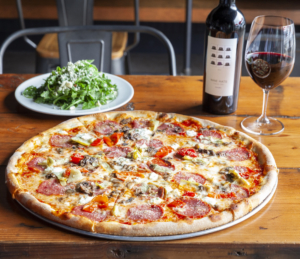
What goes better with a glass of wine than a freshly made pizza? The folks at Nine Hats Wines thought it was a good idea, so when they opened their tasting room in the SoDo Urban Works Building in Seattle in 2017, their sister company opened Nine Pies Pizzaria next door in the same building.
Born out of Walla Walla’s Long Shadows Winery, Nine Hats Wines is one of the larger wineries with a presence in Seattle. “Our first bottling was a 2008 red blend from juice that didn’t go into the Long Shadows barrels. But it’s since developed a life of its own,” said Cory Brown, Long Shadows Chief Financial Officer.
Focusing initially on the grocery channel, Brown said that more people were becoming familiar with the wines and enjoying them. “Now, we’ve been developing the direct-to-consumer side of the business, including the SoDo tasting room and wine club.” Brown’s spouse, Tracey LaPierre, was one of the first board members for the Seattle Urban Wineries Association and works independently as a lab chemist for various wineries. “She’s been able to help small and medium winemakers and even home winemakers.,” Brown explained. “She’s been really focused on that.”
The name “Nine Hats” is based on the original nine founding winemakers of Long Shadows winery and so the connection is fairly clear. “We don’t want to detract from the Long Shadows program, and so many of our wines need their own home. We built something new, and while we make some Riesling, which is popular, and our red blend, we also make Pinot Gris, Chardonnay, Cabernet Sauvignon, Merlot, Malbec, Syrah and Sangiovese,” said Brown.
In 2018, Nine Hats opened a New York style pizza restaurant called Nine Pies Pizzeria to complement its wine brand, particularly its Sangiovese wines. The restaurant won a Diner’s Choice award from Open Table that year and is still considered an “Essential Seattle Eatery” by Eater. While the winery is open Wednesday through Sunday, the pizzeria is open seven days a week and is located in the SoDo Urban Works Building at 3901 First Avenue South adjacent to the winery.
Nine Hats produces approximately 20,000 cases of wine a year, and it’s all made from Washington-grown grapes. “It’s really true [as Smallwood from Laurelhurst asserted] that the best vineyards in Washington haven’t yet been discovered. We don’t really know what the true Washington varietal is. We’re still figuring that out,” said Brown. “We can produce a lot of very good varietals, but there are still new vineyards being cultivated and there is a lot of land available, whereas in California, for example, the vineyards have largely been planted and are known quantities.”
Brown said working with the other members of the Seattle Urban Wineries Association is a boon for all of us. “You don’t have to go east of the mountains to enjoy really authentic wines,” he said. “The wineries may or may not be on site, but they are representative of what we can do here.”
:NOTA BENE CELLARS
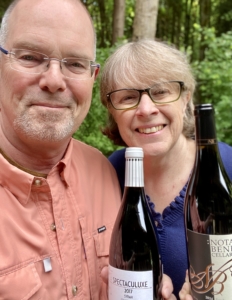
Tim Narby and his wife Carol Bryant, owners of :Nota Bene Cellars, have been living their dream of making wine since Tim retired from Boing in 2013. Their production facility is located across the street from Boing Plant # 2 in the South Park neighborhood of Seattle.
At 20 years old this year,:Nota Bene Cellars is one of the founding winery members of the Seattle Urban Wineries Association. Tim Narby and his wife, Carol Bryant, opened the winery after years of learning about and enjoying wine. Narby, a retired Boeing employee, was a home winemaker for 17 years before opening :Nota Bene. Bryant is a deputy prosecutor with King County and still works in that position, while Narby retired from Boeing in 2013.
“It’s a life-long thing for anyone who gets into wine,” said Narby. “You’re never going to taste everything that was made, but it’s a fun challenge.” Dedicating most of his retirement to working at the winery now, Narby said that :Nota Bene peaked at about 1,800 cases in 2016. “We’ve ramped down a bit since then because we’re getting older. It’s a lot of physical work. But I still love it and I get excited about harvest and the process,” he said.
All production is done at the winery, which is located across from Boeing plant #2 in the South Park neighborhood of Seattle. “I go over east over the mountains to bring the grapes home every year and that gives me a chance to walk the rows and see the vineyards,” Narby explained. “I rent a truck and head over to do the pick-ups.”
Part of the original Seattle Artisan Winery Association, :Nota Bene survived the disintegration of that group, which eventually became the Seattle Urban Wineries Association. “It wasn’t a seamless transition,” said Narby. “It was stop and start. But it was good for us to get together and it’s a good working relationship.”
Narby and Bryant work together and have a few friends who help during harvest, crush and bottling. “We do five Bordeaux varieties and then we do Syrah, Grenache, Mourvedre, Viognier and Roussanne,” Narby said. “We also do a Rose with 82 percent Grenache and 18 percent Viognier.
Like other smaller wineries, the pandemic made it hard to move wine efficiently, but Narby and Bryant didn’t give up and relied on long-time customers who knew their wines. “We open once a month on the second Saturday. After the pandemic, it has been a challenge for us to get people back into the winery,” Narby said. “But it is picking up. We’re also a part of the Tasting Room of Washington in the Pike Place Market and people can sample our wines there, too,” he said.
STRUCTURE CELLARS
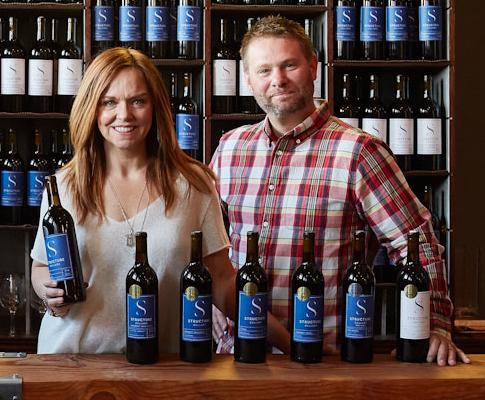
The husband-and-wife team of Brandee Slosar and Brian Grasso, owners of Structure Cellars, began making wine in the cellar of their Seattle home in 2011. The winery is now located in the SoDo Urban Works Building at 3901 1st Ave S, Seattle, and in 2021 their production of wine grew to 5,000 cases.
Structure Cellars is a success story worth making movies about. The husband and wife team of Brian Grasso and Brandee Slosar started making wine in their small craftsman house in Seattle in 2011 and in three years, they began to outgrow their basement and had to move to a new facility.
Founding member of the Seattle Urban Wineries Association, the couple went to the old Seattle Artisan Wineries and Winemaker group meetings and remembered thinking they wanted to emulate what the members were doing. “But there was a set of those people who really believed in what a group of winemakers could be and Brandee was a part of that,” said Brian.
“It was an interesting challenge,” said Brandee. “But we were trying to make it more marketable to people. They could see a map of the four districts and see all the wineries and do minimal driving and taste all these wines,” adding that some of the older members didn’t see the need for dues and how they could effectively work together. “It was a little bit of an uphill battle at first,” she said, but it was a beautiful moment when those same people said, ‘you guys did a great job.’”
“Now, we grow about 20 percent every year and this year we made 5,000 cases,” said Brian. “We have three part-time people on staff and we’ve hired our first full-time employee.”
“It sounds really professional and straightforward, but it was really hard work,” Brandee explained. “We did it ourselves. It went from 200 cases to 400 cases to 700 cases and we sold every bottle. We were pouring one day at an event and met a gentleman that really insisted that we make more wine.” The gentleman was Ross Brown. He and his wife Melody, of Joyful Brands, wanted to help grow Structure Wines. “We call them our fairy god-friends and they have a small stake in Structure and that helped us to grow,” she said.
Brian and Brandee believe Washington grapes are the best in the world. “We’re currently in 11 sites between Yakima Valley, Red Mountain and Snipes Mountain. We’re sort of all over the place,” Brian said. “We build strong relationships with the growers and they work with us to really get us the grapes we’re looking for to make the wines we want to make.” The couple makes a number of varietals, including Merlot, Cab Franc, Malbec, Mourvedre and Syrah and have a winery favorite blend of Cab Franc and Syrah. “Our customers love it and it’s different every year.”
Structure’s beginnings are a boot-strap story and they began when Brian came home one night and said he knew that he wanted to make wine. “Brian truly is a hybrid of a freight train and labrador retriever,” said Brandee. “He’s so loyal and kind and wants to please, but he’s also a freight train and if he gets an idea that he wants to pursue, God help you if you’re not on board.” The couple say they never considered what would happen if the winery didn’t work. “It’s not that we were so confident, it’s just that we didn’t know what we didn’t know,” said Brandee.
Structure, like several of the other wineries, relies mostly on direct-to-consumer sales to make ends meet, and the pandemic did impact sales, but once again, they relied on the loyalty of their club members.
“I can’t say enough about how supportive our wine club has been,” Brian said. “A year ago, we could only sell wine outside and we never put up a big three-sided tent. We just had pop-up tents and people were coming to sit outside with their raincoats and galoshes to drink wine.”
Brandee said they used creative ways to get customers to come, including contests, setting fire pits up outside and an elaborate speed-tasting set up using six different bar areas and pouring different wines at specific times in a socially distanced setting. “We want our customers to decide what they want to buy and how much they want to spend,” said Brandee. “There’s no scientific method to this other than it’s what we like and appreciate about Washington wines.”
FOUNDRY VINEYARDS
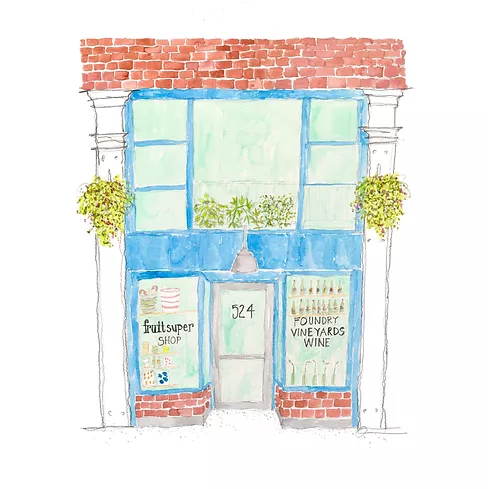
Foundry Vineyards’ Seattle tasting room, located at 524 First Avenue South in the historic Pioneer Square area, is bright and contemporary, paying homage to its flagship Walla Walla location.
Walla Walla based Foundry Vineyards opened its satellite tasting room in the Historic Pioneer Square district of downtown Seattle in 2018. The tasting room, located at 524 1st Ave. South, features current wine releases, sparkling wines, and more than 20 library wines for bottle purchase. Their award-winning wines focus on low intervention methods and small lot production.
“Pioneer Square has the oldest art walk in America, and since our brand focuses on the creative process and dialogue between art and wine, there really was no better place for our first satellite tasting room,” said Lisa Anderson, second generation co-owner of Foundry Vineyards with her brother Jay.
The 1,200 square-foot tasting room includes a tasting bar, ground floor seating for up to 30 guests, a mezzanine with communal seating, and curated merchandise by Fruitsuper, a premier Seattle design studio. The aesthetic of the space is bright and contemporary, paying homage to the flagship Walla Walla location.
Foundry Vineyards began in 1998 when Mark and Patty Anderson, parents of Jay and Lisa Anderson, planted Cabernet Sauvignon and Merlot grapes on their property. In 2003, they produced the first vintage with label artwork by celebrated artist Jim Dine. Intended to commemorate the artists who had worked with the Walla Walla Foundry, this wine became the basis for the flagship Artisan Blend and marked the beginning of a winery built upon Art+Wine. Each year an Artisan Blend is released with an Artist’s label in addition to a single varietal series featuring labels with semi-abstract photographs of work-surfaces found throughout the Foundry. Not artworks in and of themselves, these images stand to reference the creative process.
ALUEL CELLARS
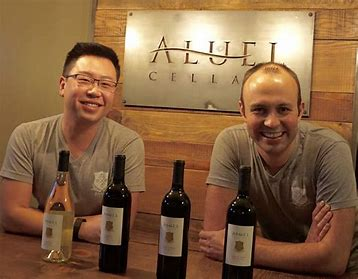
Alex Oh and Samuel Hilbert have smiles on their faces because they plan to expand the operations of Aluel Cellars from their one tasting room at 801 E. Thomas Street in Seattle, to two additional locations in 2022, one in Seattle and one outside Gig Harbor, WA.
Celebrating their five-year anniversary in business, Aluel Cellars is named by combining its founding partners, Samuel Hilbert’s and Alex Oh’s, first names. Hilbert is in Real Estate in Seattle and Oh is an attorney and vice-president at a start-up optic therapeutics company. But Oh went to UC Davis and learned the science of wine-making, while Hilbert is more self-taught since he moved to Woodinville after college and served on the Chamber of Commerce there.
The pair got the opportunity to work with Bart Fawbush of Bartholomew Winery, now located exclusively in Kennewick WA., and jumped at the chance. “Wine really revolved around our lives and when we had the chance to work with Bart, we just started experimenting with winemaking and that grew to where it started being more than an experiment,” Hilbert said. “So we started selling our wines, and in 2014, Wine Press Northwest had a best of the Northwest competition and out of 700 wines, we won best of the competition.”
That award literally put Aluel on the map and it was at the same time that they began ramping up production. “That’s when we were really committed,” Hilbert said.
When the pandemic hit, Aluel benefited from having mostly direct-to-consumer sales and a strong wine club and that continued through this year and last, though building a new base of customers was quite limited.
At about 1,000 cases per year, however, Hilbert and Oh plan on ramping up production as they open another location in Seattle (location TBA) and another facility outside of Gig Harbor in the new year.
Aluel sources their Bordeaux grapes from the Rattlesnake Hills AVA, while getting Rhone varietals from Walla Walla. Grapes for their white wines generally come from the Ancient Lakes AVA. They also make a ruby port from Suzal grapes they source from these places.
“The Seattle Urban Wineries Association has really been great for bouncing ideas off of,” Hilbert said. “We get more benefit by marketing together and we like being able to share ideas back and forth.”
Aluel has two flagship wines, one Bordeaux blend and one Rhone blend. “Those are our top award winners on our Coat of Arms line and our Regalia line and we make them almost every year,” Hilbert said. “Rose is usually our best seller, but we didn’t make enough this year, so I can’t call it my best seller. But it tends to be pretty popular.”
“We’ve built a good family with our team here,” said Hilbert. “We’re looking forward to growing and expanding to see where that takes us.”
LAURELHURST CELLARS
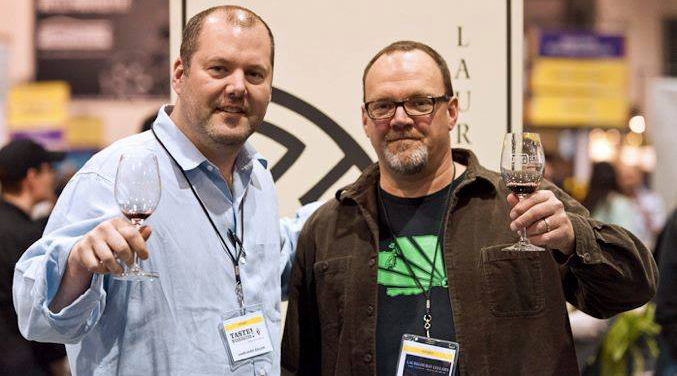
Greg Smallwood and Dave Halbgewachs are Laurelhurst Cellars and making bold, great tasting wines is their specialty. Laurelhurst is located at 3935 9th Ave. South in Seattle.
For Greg Smallwood and Dave Halbgewachs and their Laurelhurst Cellars, the last few years have been far from magical. The pandemic made selling wine and providing tastings difficult. “Dave and I do this as a passion project,” said Smallwood. “We’ve been going backwards for a couple of years. I have two other businesses and Dave has another job. We do about 1,400 cases a year, but it’s been a struggle.”
Smallwood’s honesty is as up front as his passion for wine. “We started making barrels for the three of us (the pair had a third partner when they first began) in the Laurelhurst neighborhood.” When they finally got licensed and bonded, they approached Dick Bushey and asked if they could buy fruit from him. “I think ignorance was a good thing, because we didn’t know we couldn’t just approach him. But he asked if he could taste the wine before he allowed us to put his name on it,” Smallwood said. The gambit worked, and Bushey agreed to allow Laurelhurst to display the vineyard’s name. The pair continues to source grapes from a number of vineyards, including Bushey’s, across eastern Washington.
Still, Laurelhurst’s good wine is a side hustle and a passion project for its owners. “I’ve made a lot of friends and your customers become your friends and I couldn’t exchange that for anything.”
For Smallwood, the passion is the story of his wine journey. “My epiphany wine was a Stag’s Leap Petite Sirah and I have that same story of starting off with simple, sort of fruit forward wines and then learning about these bold, great and wonderful wines.”
Smallwood and Halbgewachs are Laurelhurst, and making those bold, great and wonderful wines is their specialty. “The best vineyards in Washington have yet to be discovered,” Smallwood said. The pair have no employees, so they do everything from picking up the grapes in the eastern part of the state, as far as Walla Walla, crush and destem, ferment, top, fill the barrels, bottling, all of it. True “garagistes,” Smallwood has no illusions about the amount of work and the amount of reward, and it’s why Laurelhurst is another of the founding members of the Urban Wineries Association. “We’re all small business people and we talk each other up, which means that when we are open, we can get 40 or 50 people coming in.” Smallwood said that he played up on the wine-tasting population being here in western Washington and used to have a tag-line for Laurelhurst that read, “Toll-Free Tastings.”
True to the calling of simply making great wine, Smallwood and Halbgewachs see a future for boutique winemaking that continues to grow. “Ultimately, what I’d like to see is some younger folks come in and maybe after taking classes at the community colleges, bring some
new ideas and passion to it.” For now, Smallwood’s is enough to carry the load. “Making wine is in my blood,” he said.
Following is a list of the 26 members of the Seattle Urban Wineries Association. The list includes the name, address, phone number and website address of each winery.
Aluel Cellars, 801 E. Thomas St., Seattle, WA. 98102.
(206) 329-5994. www.aluelcellars.com.
Audacity Wine Bar by Alexandria Nicole Cellars, 806 Pike Street Seattle, WA 98101.
(206) 414-7363. www.alexandrianicolecellars.com/audacity
Browne Family Vineyards, 413 1st Ave. S, Seattle, WA 98104.
(206) 887-9463. www.brownefamilyvineyards.com.
Cascade Cliffs Vineyard & Winery, 6006 12th Ave S, Seattle, WA 98108.
(206) 453-5034. www.cascadecliffs.com.
Cloudlift Cellars, 312 S Lucile St, Seattle, WA 98108.
(206) 622-2004. www.cloudlift.net.
Contrivance Wine & Mead Co, 611 Industry Dr., Tukwila, WA 98188.
(253) 236-8259 www.drinkcontrivance.com.
Eight Bells Winery, 6213 Roosevelt Way NE Ste B, Seattle, WA 98115.
(206) 294-4131. www.8bellswinery.com
Elsom Cellars, 2960 4th Ave S, Seattle, WA 98134.
(425) 298-3082. www.elsomcellars.com.
Foundry Vineyards, 524 1st Ave S, Seattle, WA 98104.
(206) 466-5378. www.foundryvineyards.com.
Laurelhurst Cellars, 3935 9th Ave S, Seattle, WA 98108
(206) 910-9217. www.laurelhurstcellars.com
Locus Wines, 307 Occidental Ave. S., Seattle, WA. 98104.
(206) 682-1760. www.locuswines.com.
Mr. B’s Meadery & Wine Bar, 2000 Airport Way S, Seattle, WA 98134.
(206) 355-4067. www.mrbsmeadery.com.
Nine Hats Wines, 3861 1st Ave S, Seattle, WA 98134.
(206) 582-0700. www.ninehatswines.com
:Nota Bene Cellars, 9320 15th Ave S, Seattle, WA 98108.
(206) 459-2785. www.notabenecellars.com
Northwest Wine Academy, South Seattle College, 6000 16th Ave. S.W., Seattle, WA 98106.
(206) 934-5300. www.southseattle.edu/northwest-wine-academy.
Old World Tasting Room/Michael Florentino Cellars, 3861 1st Ave S, Suite A, Seattle, WA 98134.
(206) 492-5106. www.oldworldtastingroom.com.
Patterson Cellars, 3861 1st Ave. S, Seattle, WA 98134.
(206) 922-3371. www.pattersoncellars.com.
Pine Lake Cellars, 4105 32nd Ave. SW, Seattle, WA 98106.
(206) 300-5210. www.pinelakecellars.com
Princess and Bear Wines, 5628 Airport Way S., Ste 144, Seattle, WA 98108
(206) 323-4757. www.theprincessandthebear.com.
Structure Cellars, 3849 1st Ave S #D, Seattle, WA 98134.
(206) 334-6828. www.structurewines.com
T2 Cellar, 2960 4th Ave S., Suite 109, Seattle, WA 98134.
(206) 383-8248. www.t2cellar.com.
Tinte Cellars Georgetown Tasting Room, 5951 Airport Way South, Seattle, WA. 98108.
(206) 829-9941. www.tintecellars.com.
Viscon Cellars, 5910 California Ave SW Ste B, Seattle, WA 98136.
(206) 419-0468. www.visconcellars.com
Welcome Road Winery, 3804 California Ave. SW, Seattle, WA 98116.
(206) 486-0788. www.welcomeroadwinery.com.
Wilridge Winery, 1416 34th Ave, Seattle, WA 98122.
(206) 325-3051. www.wilridgewinery.com.
Wines of Substance/House of Smith, 1136 S. Albro Place, Seattle, WA 98108.
(206) 745-7456. www.winesofsubstance.com.
